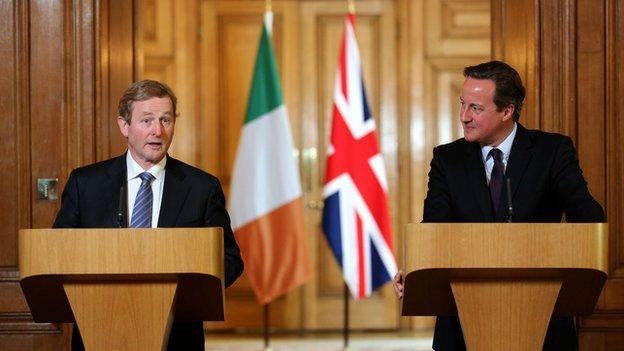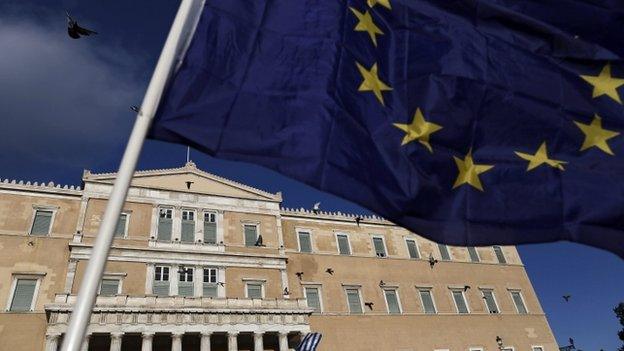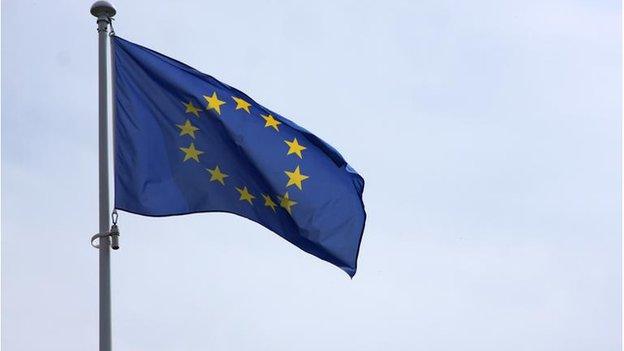Brexit: Concern over possible consequences for the Irish border
- Published
- comments

Irish Prime Minister Enda Kenny and British Prime Minister David Cameron met in London last week for talks that addressed the UK's referendum on EU membership and other issues
Covering the talks between David Cameron and Enda Kenny in Downing Street last week, it was obvious that Irish concerns about any potential British withdrawal from the European Union occupied more of the two prime ministers' time than their discussion of what might happen next in Stormont's budgetary saga.
Taoiseach (Irish Prime Minister) Enda Kenny's language sounded more diplomatic than that of former Taoiseach Bertie Ahern. Mr Ahern told the BBC any British exit from the EU would be "senseless" and set Northern Ireland back "light years". But given the close trading, social and cultural relations between Britain and Ireland, it is obvious any taoiseach will be worried about what would be a far reaching change to the status quo.
'Special position'
This week, a report from an Irish parliamentary committee, external spelled out Dublin's concerns in more detail. The Oireachtas (Irish Parliament) Joint Committee on European Union Affairs wants the Irish government to be "involved from the outset in all negotiations on the UK relationship with the EU, as UK's membership of the EU is an issue of vital national interest to Ireland".
When it comes to Northern Ireland the committee argues that - in the context of the Good Friday Agreement - "the Irish Government has a voice in relation to the future of Northern Ireland and must feature in EU negotiations with the UK".
In the event of a British withdrawal from the EU, the committee wants London and Dublin to make arrangements to replace any lost EU funding.
Perhaps even more difficult to achieve, the committee wants the Irish and UK Governments to negotiate "to have Northern Ireland recognised (in an EU context) as having 'a special position' in the UK, in view of the Good Friday Agreement". It also recommends that "special arrangements be negotiated at EU level in that context, to maintain North-South relations and Northern Irish EU citizenship rights".
Boiling that down, I assume the idea is that if someone is living in Northern Ireland, but carrying an Irish passport, they should continue to enjoy the benefits of EU membership, even if the UK has pulled out.
Some unionists are not impressed by the Irish Parliamentary Committee's intervention. Democratic Unionist Party (DUP) MEP Diane Dodds regards the committee's view that Dublin must play a role in Mr Cameron's renegotiation as "unwelcome interference in the affairs of the UK".
'Non-foreign aliens'
Should Britain leave the EU, there is no doubt there will be practical consequences so far as the UK's only land border is concerned. But will it, as the Irish committee fears, "result in issues around freedom of movement in border areas, border controls and customs checking"?
On security grounds alone, it seems unlikely that a new network of fixed customs posts and immigration offices will be erected between Newry and Dundalk or Londonderry and Donegal.
Indeed, as the Irish Parliamentary Committee itself points out, arrangements like the British Irish "Common Travel Area" which allows the free movement of people pre-date UK or Irish membership of the EU, as does the special status of Irish people living in the UK as "non-foreign aliens" (a term I hadn't been aware of until reading the committee's report).
However, it is hard to argue with the committee's contention that "should the UK leave the EU, then the Northern Ireland border would become significant as it would become an external EU border".
"This would raise considerable challenges for the open borders policy between the UK and Ireland," the committee's report added.
If a UK outside the EU sought to tighten immigration controls at Dover and Heathrow, could it completely ignore a porous land border with a neighbouring EU state?
Back in the days of Tony Blair's ill fated "e-borders" initiative, unionists objected to the idea they might be asked to show passports when travelling on flights or ferries between Northern Ireland and Great Britain.
The "e-borders" initiative was scrapped, but if the UK pulled out of the EU, would it ask Irish officials to carry out UK immigration checks, introduce more extensive mobile checks on the Northern Ireland border or flirt once again with the idea that operating checks on travel across the Irish Sea makes geographical, if not political sense?
- Published23 June 2015

- Published30 December 2020

- Published24 March 2015
